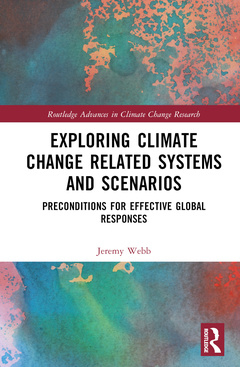Description
Exploring Climate Change Related Systems and Scenarios
Preconditions for Effective Global Responses
Routledge Advances in Climate Change Research Series
Author: Webb Jeremy Winston
Language: English
Subjects for Exploring Climate Change Related Systems and Scenarios:
· 15.6x23.4 cm · Hardback
Description
/li>Contents
/li>Readership
/li>Biography
/li>
Jeremy Webb draws on multiple disciplines to piece together the climate change puzzle, identifying what it would take to limit climate change and its impacts.
The book starts with a summary of the climate change problem and develops a Climate Change, National Interests, International Cooperation (CCNIIC) model of the climate response system. Webb reviews ?reverse stress testing?, ?backcasting? and ?theory of change? methods, showing how they can be used to collect a large sample of possible futures. He also shows how we can explore the multiverse of futures using a new method called thematic chain analysis, finding relevant connections across scenarios. In the second half of the book, Webb explores 175 scenarios collected through 27 interviews with climate change experts. From these scenarios a signal response model is developed. Preconditions for effective social change and behaviour, political will and policy, as well as business and economic activity are synthesised. Lessons include preconditions for effective global responses to climate change, showing what it takes to limit climate change and related impacts. The book finishes with an epilogue, applying the signal response model and preconditions for effective global responses to COVID-19, demonstrating that models from this book can be applied to other global response problems ? and used to quickly assess possible response strategies.
This book will be of great interest to students and scholars of climate change, environmental policy and future studies.
Part One: Introduction and background to climate responses 1.Introduction to the climate response problem 2. Climate change issues and options 3. Climate actors, institutions, and response system 4. Scenario methods and overarching themes Part Two: Exploring 175 global response scenarios 5. Climate impact, risk, and response scenarios 6. Actors and interests in climate scenarios 7. Climate change response options and scenarios 8. International climate cooperation scenarios 9. Other unusual climate related scenarios Part Three: Lessons learnt 10. Analysing climate signals, actors and responses 11. Effective global responses to climate change 12. How to limit climate change and its impact Part Four: Epilogue 13. Lessons for other global response problems References List of acronyms Glossary Appendices
Jeremy Webb has a background in geology, development studies, and a doctorate in Science, Technology, Engineering and Public Policy from University College London, UK. He has worked as an international expert in environment statistics, environmental economic accounting, natural resource classification, water statistics, climate change and development, as well as minerals and development. This includes 10 years with the United Nations in New York and Addis Ababa, and another 6 years leading working groups under the United Nations Economic Commission for Europe.
These books may interest you

Local Climate Change and Society 172.36 €

Local Climate Change and Society 58.78 €


